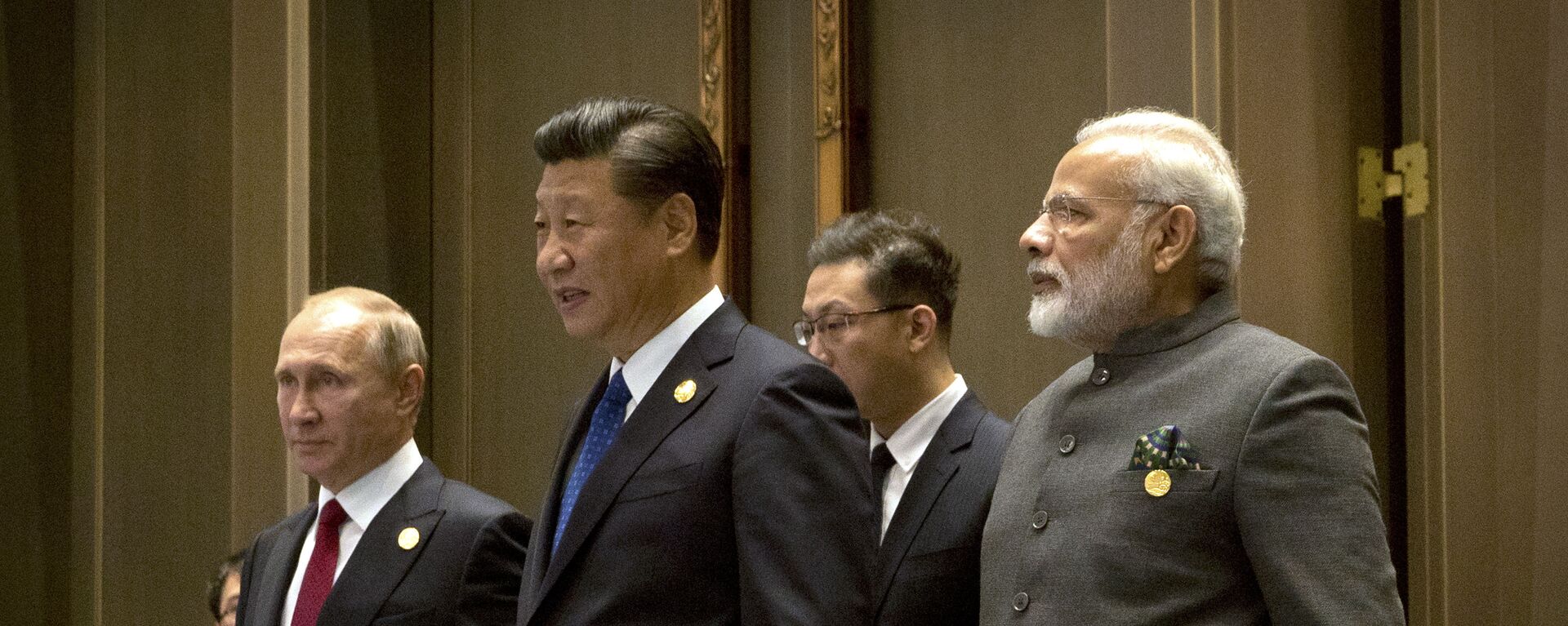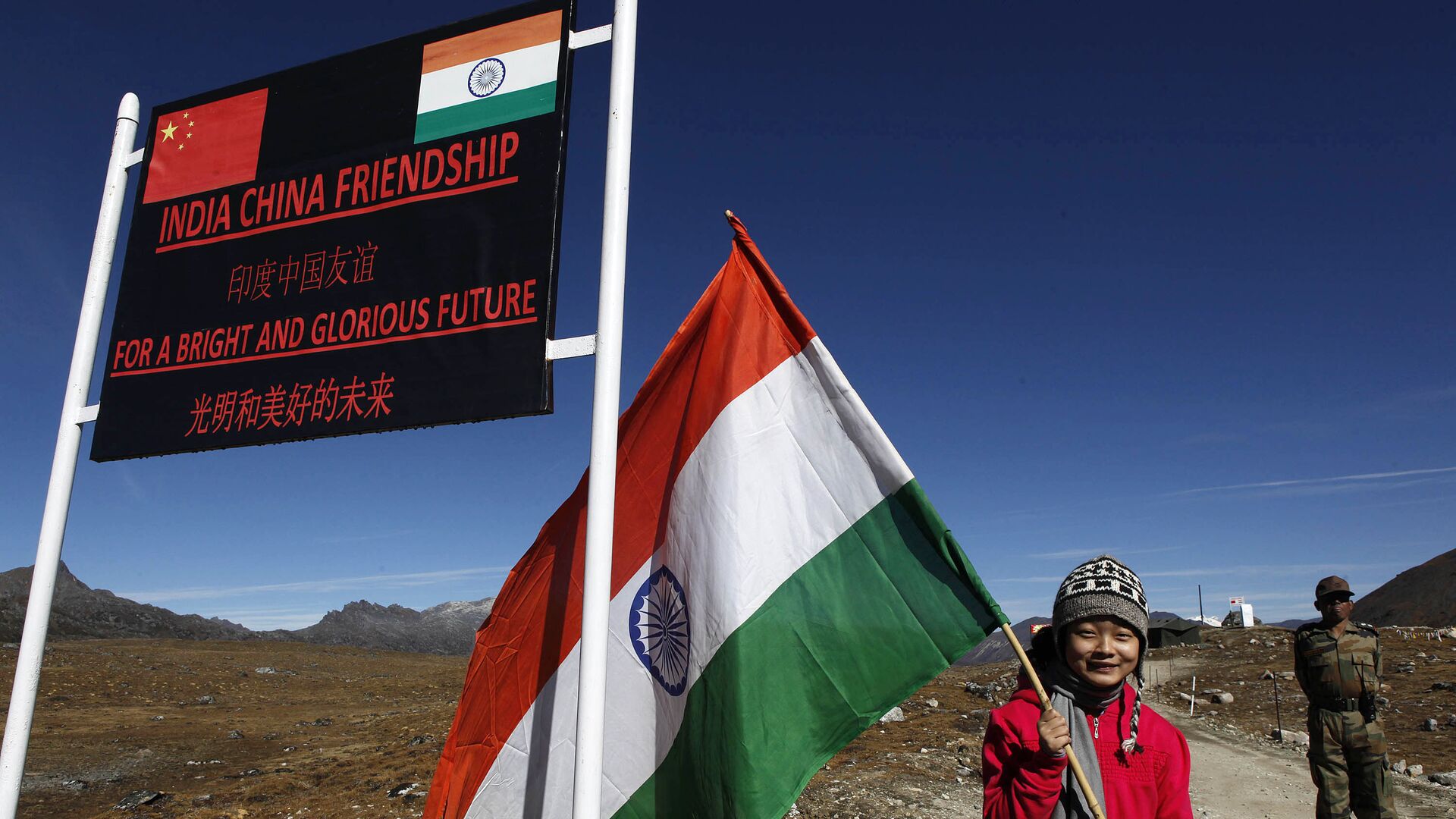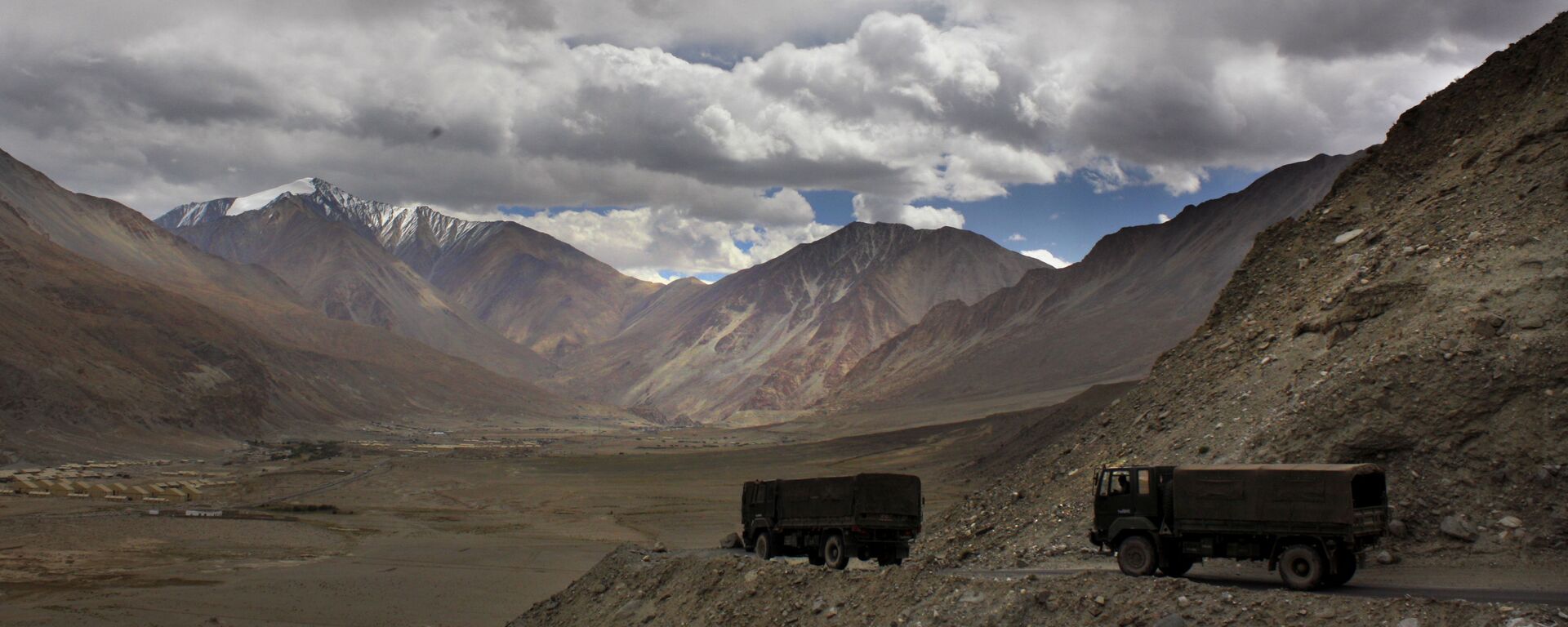https://sputnikglobe.com/20210917/india-doesnt-subscribe-to-clash-of-civilisations-theory-jaishankar-clarifies-to-chinas-wang-yi-1089147334.html
India Doesn't Subscribe to 'Clash of Civilisations' Theory, Jaishankar Clarifies to China's Wang Yi
India Doesn't Subscribe to 'Clash of Civilisations' Theory, Jaishankar Clarifies to China's Wang Yi
Sputnik International
The remarks by Indian Foreign Minister S Jaishankar come two days after India's Chief of Defence Staff (CDS) General Bipin Rawat remarked that there was some... 17.09.2021, Sputnik International
2021-09-17T07:06+0000
2021-09-17T07:06+0000
2021-09-17T07:06+0000
wang yi
ladakh standoff
china
subrahmanyam jaishankar
clash of civilizations
samuel huntington
https://cdn1.img.sputnikglobe.com/img/07e5/07/15/1083430454_0:0:3000:1688_1920x0_80_0_0_22be0f7e3e9c7f3035b566ad4dae73b6.jpg
India asked China to avoid viewing the bilateral relations between the two nations from the perspective of Beijing's ties with "third countries", during a meeting between Indian Foreign <inister Subrahmanyam Jaishankar and his Chinese counterpart Wang Yi on the sidelines of the Shanghai Cooperation Organisation (SCO) Council of Heads of State Summit in Dushanbe."Asian solidarity will depend on the example set by India-China relations", India's top diplomat told Yi during the meeting.The "Clash of Civilisations" is probably a reference to American political scientist Samuel. P Huntington's 1996 bestseller "Clash of Civilisations and the Remaking of World Order". In the book, Huntington predicted that post-Cold War differences between the US-led western allies and the rest of the world would no longer be based on differing ideologies.The American academic saw the "population explosion" in Muslim societies as well as the rise of China as the greatest challenge to the supremacy of the West in the coming decades. The US-led "War on Terror" after the 9/11 attacks as well as the ongoing geopolitical rivalry between Washington and Beijing have vindicated many of Huntington's theories.Jaishankar further noted during the meeting that "some progress" had been made in resolving the ongoing Ladakh border standoff between India and China since the last meeting between the two delegations in July, noting that bilateral relations were at their "lowest ebb" due to the dispute.Jaishankar and Yi met on the sidelines of the SCO Contact Group Group summit on Afghanistan on 14 July. Before that, the two representatives also held discussions on the sidelines of another SCO meeting in Moscow in September of last year.The Indian Foreign Ministry announced in a press release on 6 August, around three weeks after the Dushanbe engagement, that troops from both countries had disengaged from the Gogra area, one of the friction points in the eastern Ladakh region.The top commanders from the two Asian powerhouses met on 31 July for the 12th round of talks in a bid to find a solution to the border impasse. The Indian Army and People's Liberation Army (PLA) have been involved in a disengagement process since February of this year to end the dispute, the deadliest between India and China in over four decades.At present, the two armies have agreed to cease forward deployments from two areas — the north and south banks of Pangong Tso Lake and the Gogra Post.Yet, around 50,000-60,000 troops from both nations are present at Depsang Plains, a strategically located region next to the tri-junction with Pakistan-administered Kashmir.Twenty Indian and four Chinese soldiers died during a deadly clash in the Galwan Valley region of eastern Ladakh on 15-16 June 2020. Addressing a security conference in January of this year, Jaishankar said that the incident has "profoundly disturbed" trust between the two nations and that peace and tranquility along the Line of Actual Control (LAC) is necessary for the overall development of bilateral relations.Wang has, however, called upon India to place the border issue at an "appropriate" level in relations.While New Delhi accuses Beijing of instigating the border dispute by encroaching upon territories previously patrolled by the Indian Army, China says that India disturbed the status quo in the region through its upgrading of border infrastructure.
https://sputnikglobe.com/20210806/india-china-withdraw-troops-from-most-volatile-friction-point-of-gogra-post-in-eastern-ladakh-1083543774.html
https://sputnikglobe.com/20210909/brics-india-pledges-to-boost-trade-tech-ties-with-china-amid-ladakh-border-standoff-1088911089.html
ladakh standoff
china
Sputnik International
feedback@sputniknews.com
+74956456601
MIA „Rossiya Segodnya“
2021
News
en_EN
Sputnik International
feedback@sputniknews.com
+74956456601
MIA „Rossiya Segodnya“
Sputnik International
feedback@sputniknews.com
+74956456601
MIA „Rossiya Segodnya“
wang yi, ladakh standoff, china, subrahmanyam jaishankar, clash of civilizations, samuel huntington
wang yi, ladakh standoff, china, subrahmanyam jaishankar, clash of civilizations, samuel huntington
India Doesn't Subscribe to 'Clash of Civilisations' Theory, Jaishankar Clarifies to China's Wang Yi
The remarks by Indian Foreign Minister S Jaishankar come two days after India's Chief of Defence Staff (CDS) General Bipin Rawat remarked that there was some "jointmanship" between "Sinic" and "Islamic civilisations" to counter western civilisation, making a reference to Samuel Huntington's seminal "Clash of Civilisations" thesis.
India asked China to avoid viewing the bilateral relations between the two nations from the perspective of Beijing's ties with "third countries", during a meeting between
Indian Foreign <inister Subrahmanyam Jaishankar and his Chinese counterpart Wang Yi on the sidelines of the Shanghai Cooperation Organisation (SCO) Council of Heads of State Summit in Dushanbe.
"India had never subscribed to any clash of civilisations theory. He (Jaishankar) said that India and China had to deal with each other on merits and establish a relationship based on mutual respect", an Indian Foreign Ministry release said.
"Asian solidarity will depend on the example set by India-China relations", India's top diplomat told Yi during the meeting.
The "Clash of Civilisations" is probably a reference to American political scientist Samuel. P Huntington's 1996 bestseller "Clash of Civilisations and the Remaking of World Order". In the book, Huntington predicted that post-Cold War differences between the US-led western allies and the rest of the world would no longer be based on differing ideologies.
The American academic saw the "population explosion" in Muslim societies as well as the rise of China as the greatest challenge to the supremacy of the West in the coming decades. The US-led "War on Terror" after the 9/11 attacks as well as the ongoing geopolitical rivalry between Washington and Beijing have vindicated many of Huntington's theories.
Jaishankar further noted during the meeting that "some progress" had been made in resolving the ongoing Ladakh border standoff between India and China since the last meeting between the two delegations in July, noting that bilateral relations were at their "lowest ebb" due to the dispute.
Jaishankar and Yi met on the sidelines of the SCO Contact Group Group summit on Afghanistan on 14 July. Before that, the two representatives also held discussions on the sidelines of another SCO meeting in Moscow in September of last year.
The Indian Foreign Ministry announced in a press release on 6 August, around three weeks after the Dushanbe engagement, that troops from both countries had disengaged from the Gogra area, one of the friction points in the eastern Ladakh region.
"As per the agreement, both sides have ceased forward deployments in this area in a phased, coordinated, and verified manner", said the official statement.
The top commanders from the two Asian powerhouses met on 31 July for the 12th round of talks in a bid to find a solution to the border impasse. The Indian Army and People's Liberation Army (PLA) have been involved in a
disengagement process since February of this year to end the dispute, the deadliest between India and China in over four decades.
At present, the two armies have agreed to cease forward deployments from two areas — the north and south banks of Pangong Tso Lake and the Gogra Post.
Yet, around 50,000-60,000 troops from both nations are present at Depsang Plains, a strategically located region next to the tri-junction with Pakistan-administered Kashmir.
Twenty Indian and four Chinese soldiers died during a deadly clash in the Galwan Valley region of eastern Ladakh on 15-16 June 2020. Addressing a security conference in January of this year, Jaishankar said that the incident has "profoundly disturbed" trust between the two nations and that peace and tranquility along the Line of Actual Control (LAC) is necessary for the overall development of bilateral relations.
Wang has, however, called upon India to place the border issue at an "appropriate" level in relations.

9 September 2021, 11:15 GMT
While New Delhi accuses Beijing of instigating the border dispute by encroaching upon territories previously patrolled by the Indian Army, China says that India disturbed the status quo in the region through its upgrading of border infrastructure.
"We stand against the development of infrastructure facilities aimed at military contention along the border area. Based on the two sides' consensus, neither should take actions along the border that might escalate the situation to avoid undermining the two sides' efforts to ease the situation", Chinese Foreign Ministry spokesperson Zhao Lijian said in October of last year.



